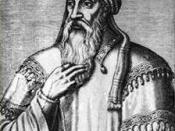The Third Crusade (1189 - 1192 A.D.) was just one of a series of religious wars fought between Muslims in the Middle East and European Christians to take control of the Holy City of Jerusalem. This Third Crusade is unique because of the two iconic leaders that led each side of the conflict. These two leaders were King Saladin, the Sultan of Egypt led the Islamic forces to defend Jerusalem from King Richard I of England, who was trying to retake the Holy City in the name of Christianity. Throughout history, chroniclers and historians portray these two leaders as charismatic, honorable, virtuous, chivalrous, among other magnanimous adjectives. Along with this very flattering portrayal, the history and chronicles portray these men in such ways, they almost seem mythical in nature; that they can do things beyond the capabilities of most "normal" men. Truly, these exaggerated representations in the historiography and chronicling of these two figures and it is this exaggerated representation which has shaped how people saw and indeed still see these two men.
Additionally, there is ample evidence in both primary and secondary sources which point out that these qualities that historians and chroniclers attribute to these two iconic figures are accurate reflections of the ideals and values of the two respective cultures to which they belonged.
Even in the earliest histories and chronicles, the authors of said histories made Saladin and Richard out to be more than just ordinary men. Baha' al-Din Ibn Shaddad wrote The Rare and Excellent History of Saladin (translated by scholar D.S. Richards) within a decade of the end of the Third Crusade. Shaddad was a scholar who met Saladin on multiple occasions and wrote many treatises on the Third Crusade. Shaddad's works were well known at the time by his contemporaries and his...


